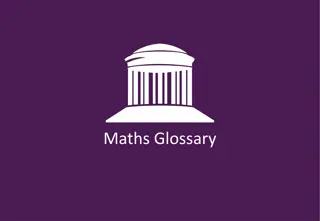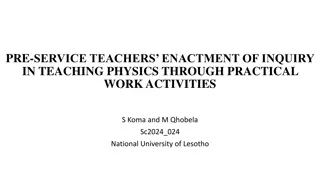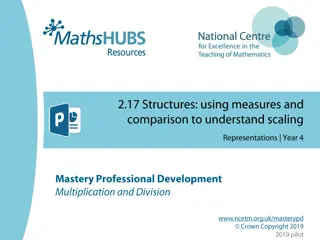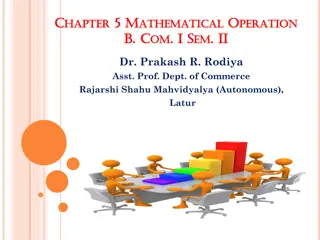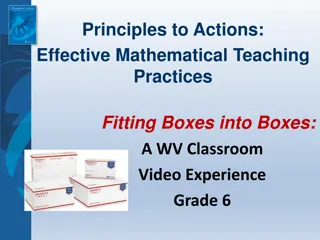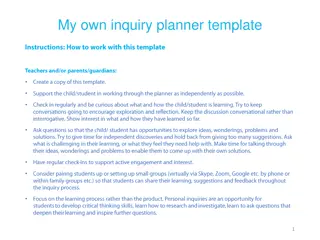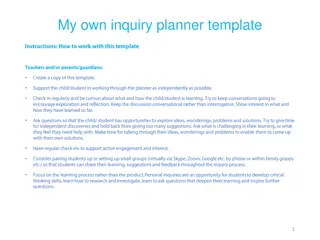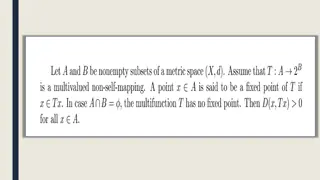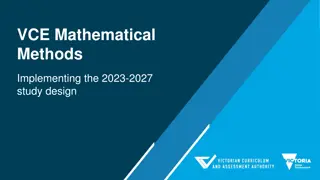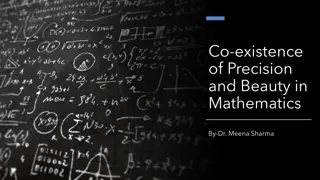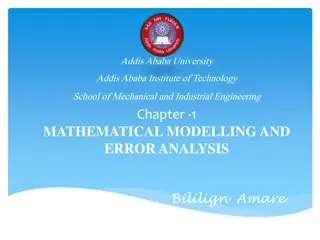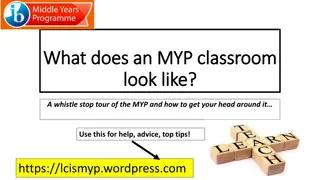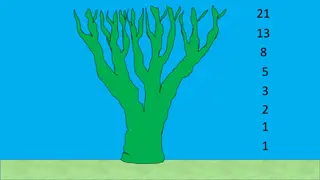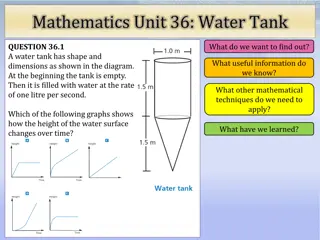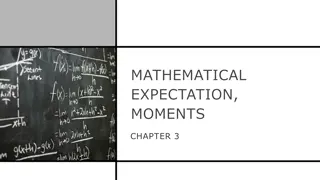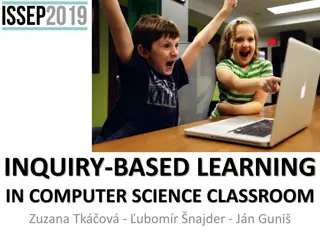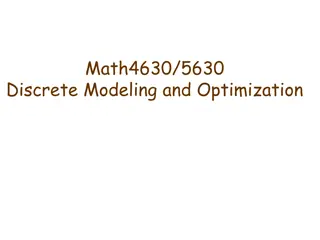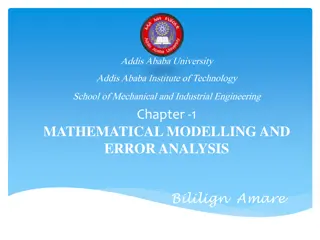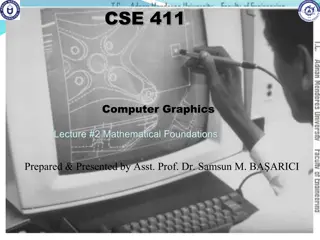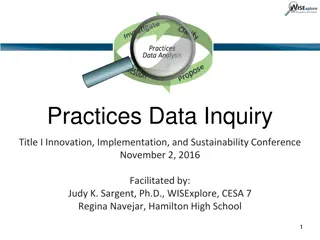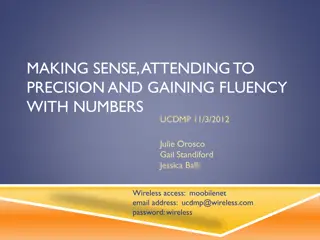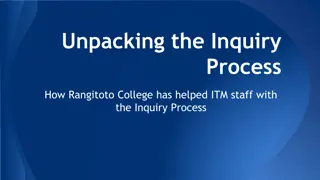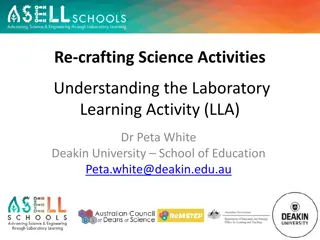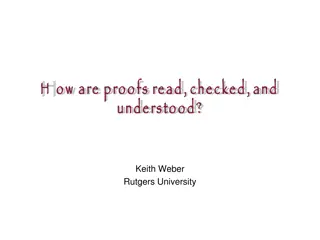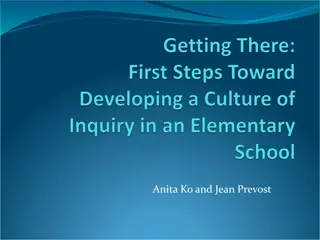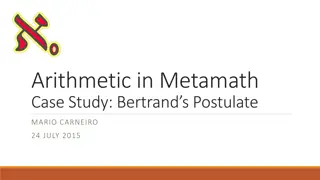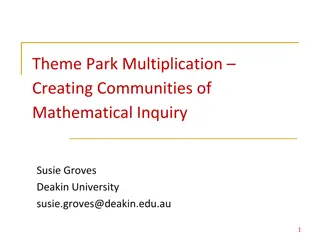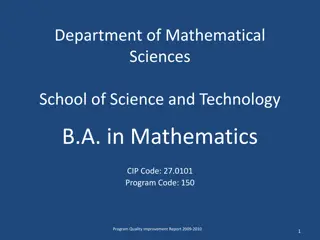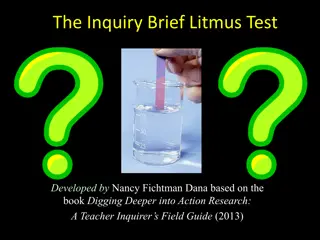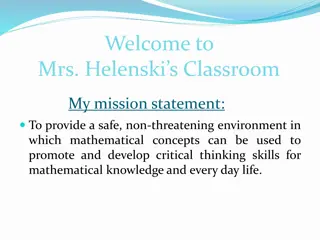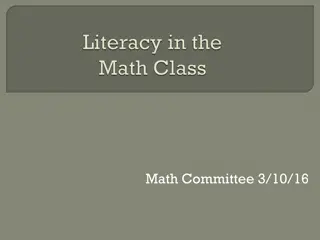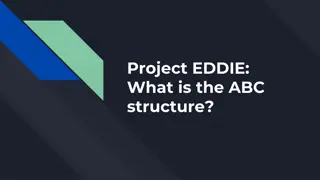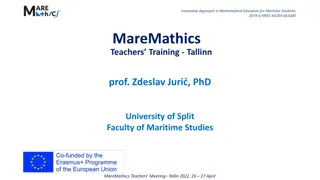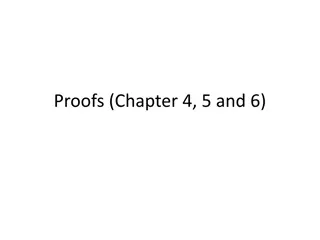Mathematical Checkpoints and Equations Activities for Year 7 Students
Engage Year 7 students in a series of 16 checkpoint activities and 12 additional activities focused on expressions, equations, and mathematical concepts. Explore topics like checks and balances, shape balance, equations from bar models, number line concepts, and more to enhance mathematical understa
3 views • 42 slides
Effective Strategies for Teaching Mathematics: Concrete, Pictorial, Abstract Approach
Utilizing concrete manipulatives, pictorial representations, and abstract symbols is a crucial method for enhancing mathematical understanding. This approach guides students from hands-on exploration to visual representation and ultimately to solving problems with symbols. By engaging in this progre
1 views • 25 slides
Understanding Pre-Service Teachers' Inquiry Teaching in Physics
Lesotho's curriculum emphasizes hands-on activities and inquiry teaching strategies in Physics. However, challenges such as resource limitations affect practical work involvement. This study explores the levels of inquiry implemented by Physics pre-service teachers (PSTs) during their teaching pract
0 views • 10 slides
Evolution of Mathematical Theories and Proof Systems
Development of mathematical theories such as model theory, proof theory, set theory, recursion theory, and computational complexity is discussed, starting from historical perspectives with Dedekind and Peano to Godel's theorems, recursion theory's golden age in the 1930s, and advancements in proof t
1 views • 29 slides
Mathematical Relationships and Measurements Illustrated with Images
Explore various mathematical concepts such as measurements, proportions, and equations depicted through a series of images. From calculating ribbon lengths to understanding weight conversions, this visual journey provides a unique perspective on mathematical problem-solving and applications.
0 views • 22 slides
Mastering Symbol Substitution in Mathematical Operations
In the realm of mathematical operations, understanding symbol substitution is key to solving questions efficiently. Learn how to interchange mathematical signs and symbols to find the correct answer. With examples and guidance, grasp the concept of symbol substitution and excel in tackling such ques
0 views • 25 slides
Enhancing Mathematical Teaching Practices for Student Success
Explore the evolution of standards-based mathematics education reform through a 25-year journey, emphasizing the crucial role of effective teaching in ensuring mathematical success for all students. Discover the challenges faced in improving math education and the principles that guide meaningful le
0 views • 64 slides
Exploring Skills and Attributes for Personal Inquiry Planning
Discover the skills and learner profile attributes you currently utilize in your personal inquiry process, and reflect on areas for improvement to enhance your planning effectiveness. Engage with insightful image slides depicting key aspects of inquiry planning and self-assessment.
1 views • 9 slides
Exploring My Inquiry Skills through Visual Templates
Dive into a visual journey of self-reflection with images depicting inquiry planning templates. Reflect on your current skill usage, identify areas for improvement, and explore learner profile attributes to enhance your personal inquiry process.
1 views • 9 slides
Mathematical Definitions and Theorems Illustrated
In this collection of images, various mathematical concepts are visually presented, including definitions, theorems, and proofs. The slides cover a range of topics in a structured manner, providing a concise overview of key mathematical principles. From foundational definitions to detailed proofs, t
0 views • 12 slides
Implementing the VCE Mathematical Methods 2023-2027 Study Design
The VCE Mathematical Methods study design for 2023-2027 includes a detailed outline of the curriculum, revisions in Units 1-4, investigations leading to assessments, and FAQs. The study design was the result of thorough consultation and review, published in February 2022 and accredited by VRQA. It f
5 views • 31 slides
Exploring the Harmony of Precision and Beauty in Mathematics
Delve into the intricate relationship between precision and beauty in mathematics as elucidated by Dr. Meena Sharma. Uncover the meaning and definition of these concepts through thought-provoking examples. Discover the nuances of precision and explore the distinction between accuracy and precision.
0 views • 8 slides
Mathematical Modeling and Error Analysis in Engineering
Mathematical modeling plays a crucial role in solving engineering problems efficiently. Numerical methods are powerful tools essential for problem-solving and learning. This chapter explores the importance of studying numerical methods, the concept of mathematical modeling, and the evaluation proces
0 views • 10 slides
Understanding the MYP Classroom: A Comprehensive Overview
Explore the key components of an MYP classroom, including the integration of AtL skills, progression through inquiry questions, and alignment of summative tasks with the statement of inquiry. Discover how students engage with concepts, global contexts, and self-assessment, fostering deep inquiry and
0 views • 17 slides
Exploring Fibonacci Sequence, Bee Hives, and Squares in Nature
Discover the fascinating world of Fibonacci sequence through the lens of bees, sunflowers, and mathematical patterns in nature. Learn about the Fibonacci numbers, bee colonies, the beauty of sunflowers, and the mathematical properties of squares. Dive into the history of Leonardo of Pisa and his con
0 views • 16 slides
Understanding Water Tank Dynamics Through Mathematical Analysis
Explore the dynamics of a water tank being filled at a rate of one litre per second and analyze how the height of the water surface changes over time. Learn about the useful information available, the mathematical techniques required, and examine graphs depicting the changing water levels. Gain insi
0 views • 5 slides
Understanding Mathematical Expectation and Moments in Probability
Mathematical expectation, also known as expected value, plays a crucial role in probability theory. It represents the average outcome or value of a random variable by considering all possible values weighted by their respective probabilities. This concept helps in predicting outcomes and making info
0 views • 17 slides
**Exploring Inquiry-Based Learning in Computer Science Education**
Inquiry-based learning (IBL) in computer science classrooms focuses on fostering communication, collaboration, decision-making, and problem-solving skills among students. The approach involves students constructing knowledge through independent, active activities based on real-world experiences. How
0 views • 18 slides
Understanding Discrete Optimization in Mathematical Modeling
Discrete Optimization is a field of applied mathematics that uses techniques from combinatorics, graph theory, linear programming, and algorithms to solve optimization problems over discrete structures. This involves creating mathematical models, defining objective functions, decision variables, and
0 views • 12 slides
Understanding Mathematical Modeling and Error Analysis in Engineering
Mathematical modeling plays a crucial role in problem-solving in engineering by using numerical methods. This involves formulating problems for solutions through arithmetic operations. The study of numerical methods is essential as they are powerful problem-solving tools that enhance computer usage
5 views • 10 slides
Mathematical Foundations for Computer Graphics: Geometry, Trigonometry, and Equations
This lecture covers essential mathematical tools for computer graphics, including 2D and 3D geometry, trigonometry, vector spaces, points, vectors, coordinates, linear transforms, matrices, complex numbers, and slope-intercept line equations. The content delves into concepts like angles, trigonometr
1 views • 53 slides
Simplifying Residency Shift Scheduling with Mathematical Programming Techniques
This project, led by Professor Amy Cohn and William Pozehl, aims to demonstrate how mathematical programming techniques can simplify the complex task of residency shift scheduling. The Residency Shift Scheduling Game highlights the challenges of manual scheduling and the ease of using mathematical p
1 views • 37 slides
Innovation & Sustainability Conference: Data Inquiry for School Improvement
Explore how student data findings drive inquiry into practices, learn to identify and collect data as practice indicators, understand the Practices Data Inquiry process, and reflect on a Wisconsin school's journey from data analysis to practice analysis.
0 views • 47 slides
Understanding Business Inquiry Letters - Types and Examples
Business inquiry letters play a crucial role in establishing communication and gathering information between businesses. This article explores the types of inquiry letters, such as import, domestic, export, and personal, with detailed examples for each type. Learn how to effectively communicate your
0 views • 11 slides
Mathematical Practices and Problem-Solving Approaches
Explore the importance of mathematical practices and problem-solving strategies in gaining fluency with numbers. Discover resources such as King Arthur's Round Table activity and Common Core State Standards for Mathematics to enhance reasoning, precision, and mathematical modeling skills.
0 views • 35 slides
Enhancing Professional Development Through the Inquiry Process at Rangitoto College
Explore how Rangitoto College has supported its ITM staff through innovative practices, mentorship programs, and a culture of inquiry. From unpacking the inquiry process to effective pedagogy, discover the collaborative efforts that promote continuous professional growth and development.
0 views • 35 slides
Independent Inquiry into Child Sexual Abuse (IICSA) Investigations Overview
The Independent Inquiry into Child Sexual Abuse (IICSA) is a statutory inquiry established in March 2015 covering England and Wales, led by Professor Alexis Jay. It has launched 13 investigations into various institutions including cases of child exploitation, institutional responses, and accountabi
0 views • 14 slides
Enhancing Science Education Through Laboratory Learning Activities
Explore the importance of laboratory learning activities (LLAs) in science education, focusing on contemporary science representation, inquiry skills, and conceptual learning. Discover the benefits of inquiry-based learning, teaching science inquiry skills, and incorporating more inquiry-based learn
0 views • 22 slides
Understanding the Queensland Parliament's Inquiry on Vilification and Hate Crimes
The Queensland Parliament's Legal Affairs & Safety Committee is leading an inquiry to investigate hate crimes and vilification in Queensland, examining the effectiveness of current laws and encouraging submissions and stories to help address these issues. The inquiry was prompted by the rise in publ
0 views • 27 slides
Understanding and Checking Mathematical Proofs
Reading and understanding mathematical proofs involves careful analysis of logic and reasoning. Mathematicians and students use various strategies to ensure correctness, such as examining assumptions, following step-by-step logic, and verifying conclusions. This process is crucial for grasping the v
1 views • 79 slides
Developing a Culture of Inquiry in Elementary School: A Journey Overview
Explore the journey of developing a culture of inquiry in an elementary school through three inquiry cycles. Starting with the introduction of Inquiry Based Learning, sustaining interest, learning outcomes, and evolving questions are discussed alongside examples of inquiry learning at various school
0 views • 26 slides
Exploring Metamath: A Computer Language for Mathematical Proofs
Metamath is a computer language designed for representing mathematical proofs. With several verifiers and proof assistants, it aims to formalize modern mathematics using a simple foundation. The Metamath-100 project is focused on proving a list of 100 theorems, with significant progress made in prov
0 views • 17 slides
Exploring Mathematical Inquiry in Theme Park Multiplication Communities
Delve into the world of mathematical inquiry through structured problem-solving lessons, careful task selection, and creating a classroom community of inquiry. Witness students' unique solution strategies and engage in discussions on multiplication concepts, all aimed at fostering a deeper understan
0 views • 13 slides
Mathematics Program Quality Improvement Report 2009-2010 at Department of Mathematical Sciences
This report outlines the student-learning outcomes of the Mathematics program at the Department of Mathematical Sciences. It covers areas such as knowledge of mathematical content, reasoning and proof, mathematical representation and problem-solving, mathematical communication, and knowledge of tech
0 views • 29 slides
Explore the Inquiry Brief Litmus Test for Effective Action Research
Delve into the Inquiry Brief Litmus Test developed by Nancy Fichtman Dana for robust action research planning. Understand the key components of an inquiry brief and how it guides teams in their exploration of school learning capacity. Utilize the series of questions in the litmus test to refine your
0 views • 30 slides
Enhancing Critical Thinking Skills Through Mathematical Concepts in Mrs. Helenski's Classroom
Mrs. Helenski's classroom provides a safe environment where mathematical concepts are utilized to develop critical thinking skills for both mathematical knowledge and everyday life. With a focus on promoting metacognition in Geometry Honors, students are challenged to apply, prove, justify, and expl
0 views • 20 slides
Understanding Mathematical Literacy and Its Importance in Education
Recognizing the language of mathematics, understanding symbols, and being able to explain solutions are key components of mathematical literacy. It goes beyond merely answering questions correctly to encompass explaining reasoning and exploring concepts actively. The Standards for Mathematical Pract
0 views • 36 slides
Understanding the ABC Structure and Pedagogical Approach in Science Education
Explore the ABC structure of inquiry-based learning – from Prescriptive to Open Inquiry, and understand the rationale behind this pedagogical approach in providing authentic disciplinary experiences to students. Overcome challenges in managing unknowns in open inquiry and discover the key elements
0 views • 12 slides
Innovative Approach in Mathematical Education for Maritime Students
Explore the innovative approach in mathematical education for maritime students as presented during the MareMathics Teachers Training and Meeting in Tallinn. The sessions covered topics such as mathematical applications in thermodynamics, including partial derivatives, derivations, and integrals wit
0 views • 11 slides
Understanding Mathematical Proofs and Concepts
Explore the world of mathematical proofs through chapters 4, 5, and 6. Delve into terminology, theorems, definitions, divisors, and accepted axioms used in mathematical reasoning. Discover the logic behind proofs and various methods employed in establishing the truth of mathematical statements.
1 views • 101 slides

